Last Updated on July 8, 2021
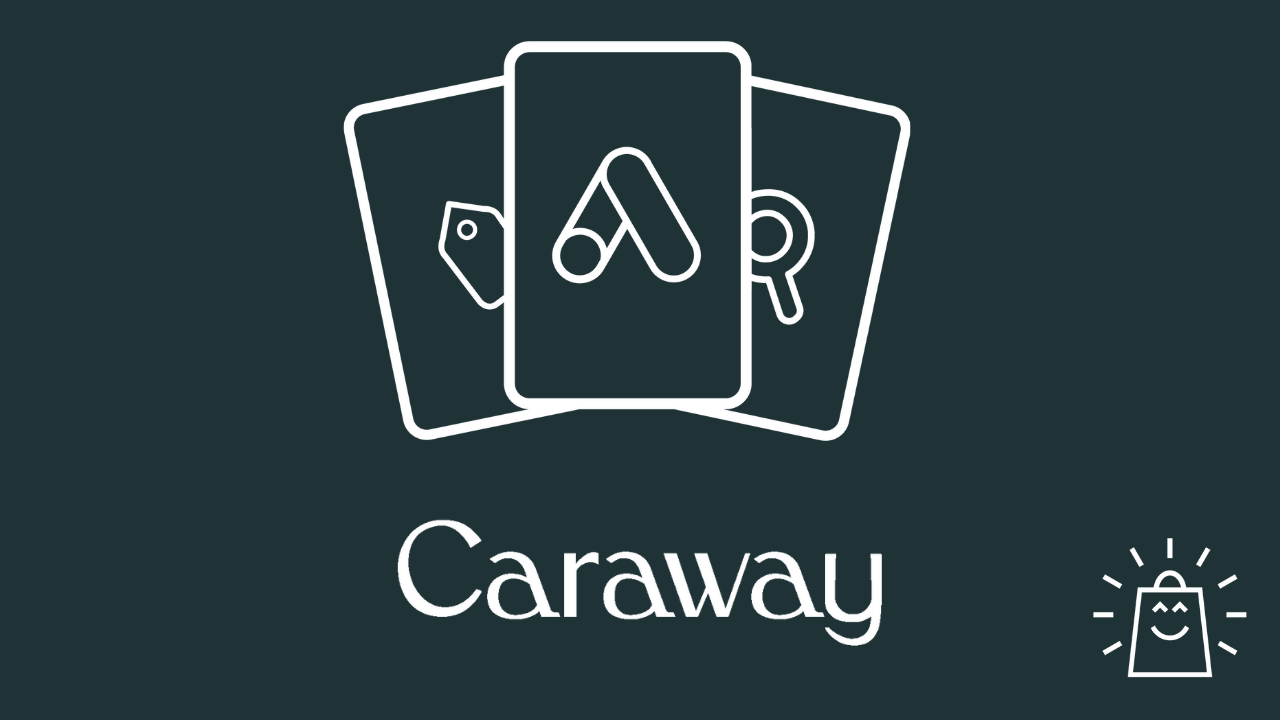
In this installment of our Google Ads breakdowns, we’re talking about Caraway!
Caraway Home is a brand that sells cookware, their main focus are ceramic pots and pans that are non-stick and non-toxic.
These last couple of years, a number of new hip DTC kitchen brands have popped up, Caraway is one of those new entrants.
In this article, we’re going to dive into how they use Google Ads, how much they spend on it and how much profit all of that work generates for them.
Table of Contents
Caraway, The Business
Caraway Home was founded in 2018 by Jordan Nathan, a cookware industry veteran.
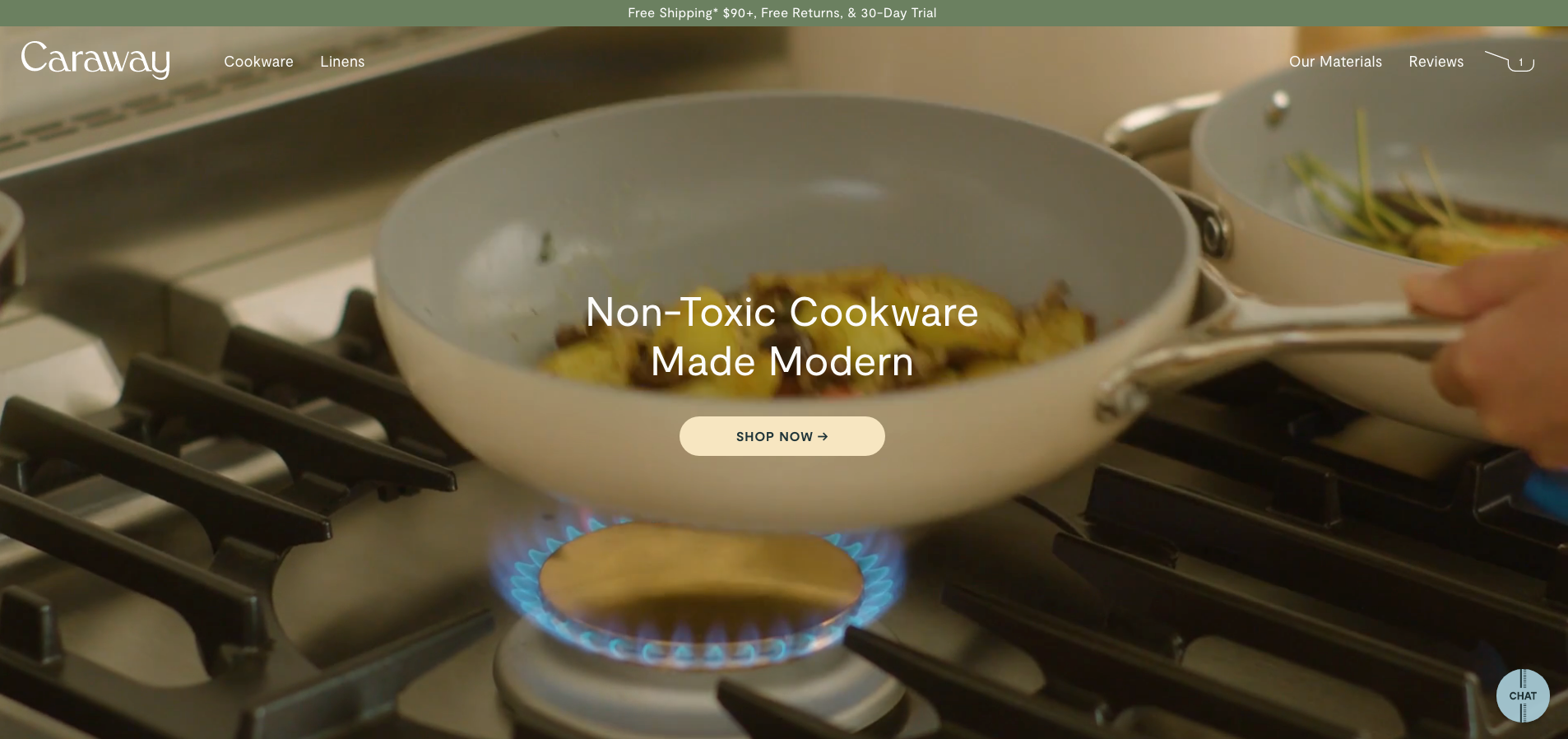

This is a pretty crowded space, so starting out, Caraway tried to distinguish itself by focusing on creating safe products with great design.
They kept the number of products intentionally low, a set of 4 pots and pans.
The most distinct feature is the design of the product. Both functional, how the pots and pans stack, but also how they look.
They offer a wide range of colors that aren’t very common in the kitchen. Take this lavender/gold combination:
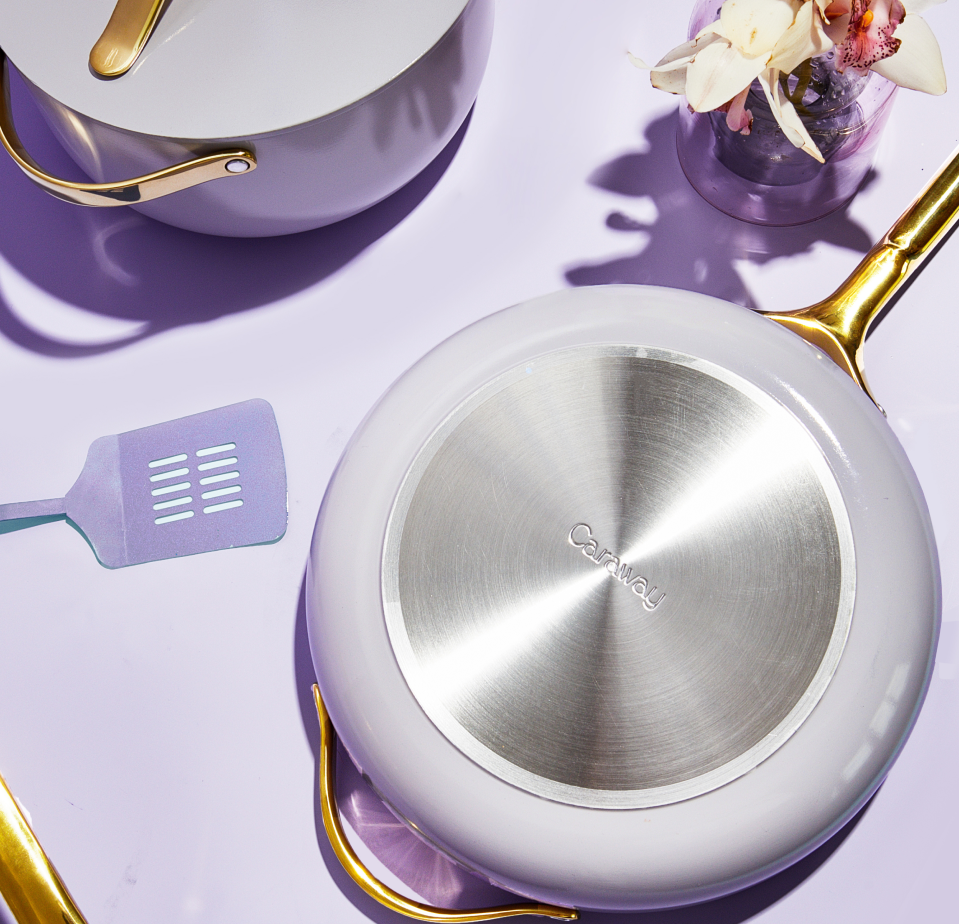

The COVID-19 Effect
COVID-19 really accelerated Caraway sales. During lockdown, everyone was stuck at home and many found a renewed joy in cooking.
This led to a 20x growth from January 2020 compared to 2021!
Soaring demand compared with supply chain hiccups (everything is manufactured in China), has caused products to be out of stock and have back-delivery dates.
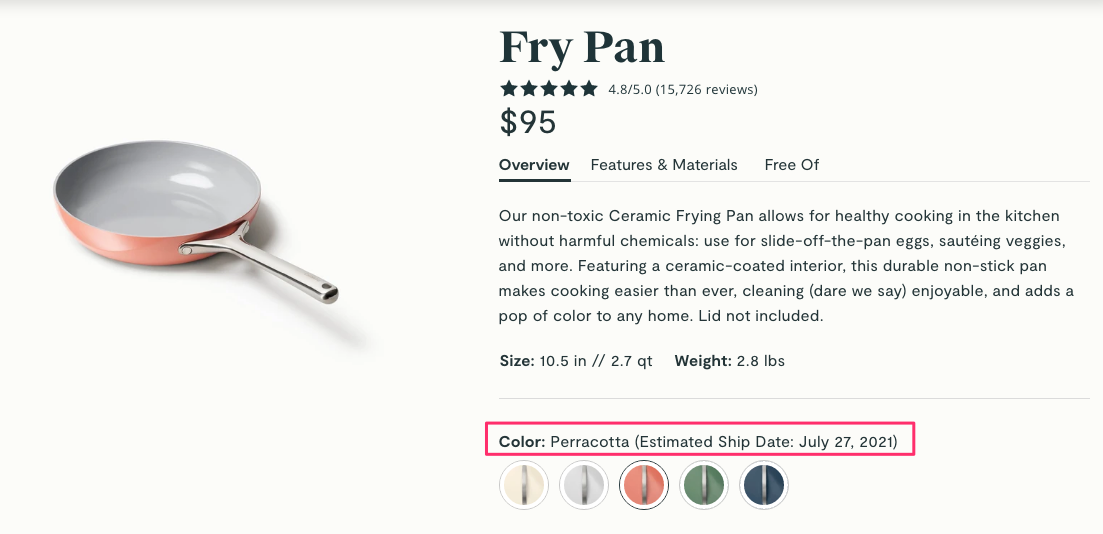

In the screenshot above, note the “Estimated ship date”. This is about 1 month from when writing this, while other items will ship immediately.
Funding
Caraway initially funded its growth through a small round they raised from investors. But after they used profits to fund growth.
In May 2020, on the back of the strong growth during the initial COVID-19 months, they raised $5.3M in venture capital.
With 20x growth year over year, I can imagine that there are a lot of parts of the business that could use a cash infusion. But a big part of this money will also be used to explore a wider product offering. This can help them get around some of the obstacles we’ll look at later in this article.
Now that you have a little more background on the business, let’s take a look at what’s happening on their website.
Caraway Website Analysis
Carawayhome.com gets 327,00 visitors a month.
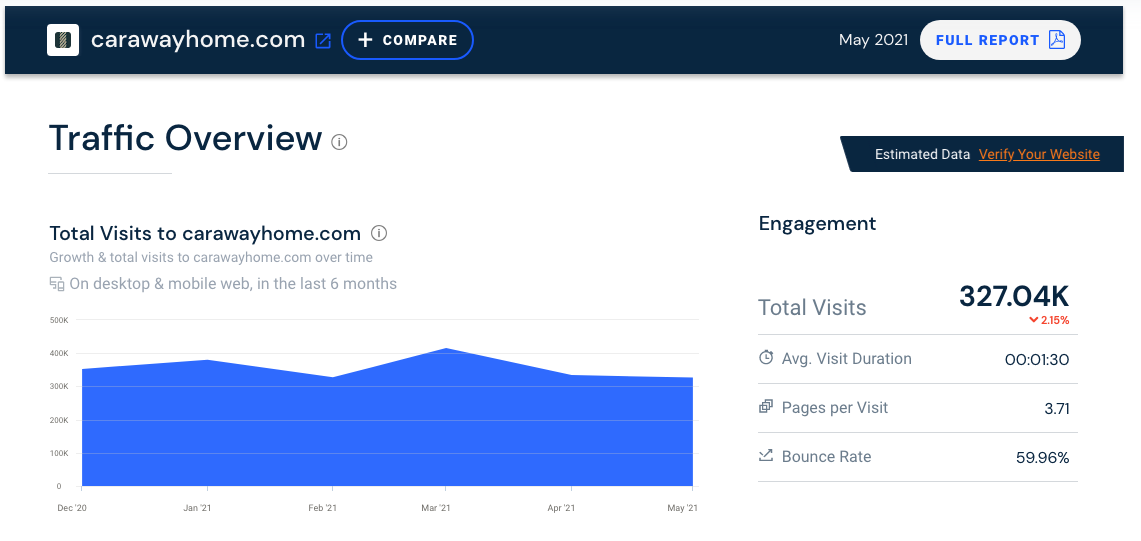

About 39% of visitors come from search, 29% is direct traffic and 22% come from Display.
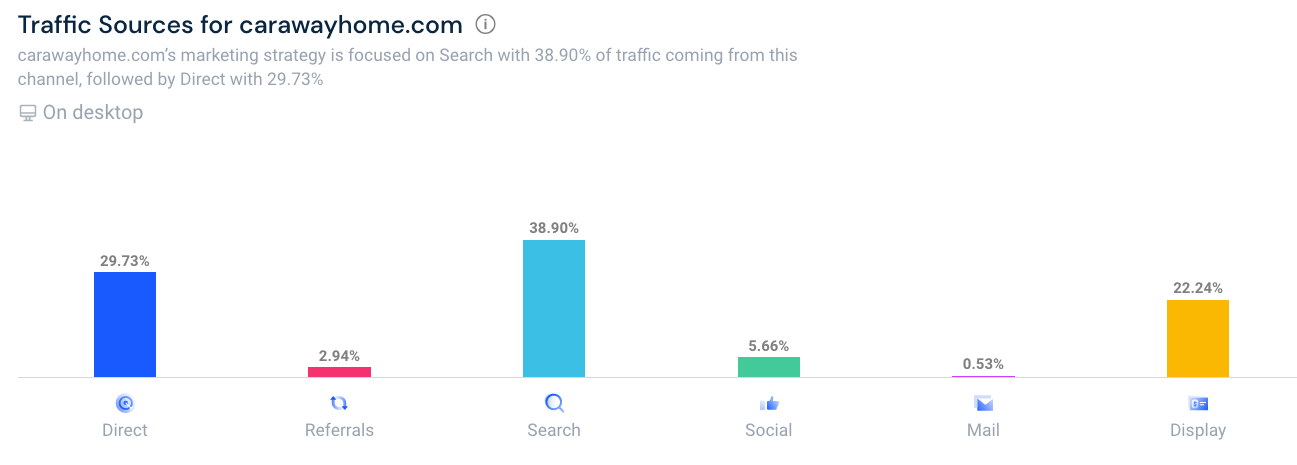

Of that search traffic, 51% is organic search, and 49% is paid search.
This means that paid search drives 63,063 visitors/mo.
Paid search is still a fairly new game for Caraway. Although they’ve been around since 2018, they only started advertising on Google in the summer of 2020.
We can see that in this graph from Semrush:


Here is what I think might be happening.
Before starting with ads, they were reliant on influencers and affiliate marketing to drive sales.
After the big jump from the early COVID lockdown, sales probably started declining over the Summer.
So they started looking into new channels, like Google Ads.
So let’s see what they’ve been up to since!
Caraway Google Ads Campaigns
Caraway spends $59,000 / mo on Google Ads, divided up between Search and Shopping campaigns.
Here is how that breaks down:
| Ad Spend | Clicks | CPC | |
| Search Ads | $26,680 | 23,000 | $1.16 |
| Shopping Ads | $32,250 | 40,000 | $0.75 |
| TOTAL | $58,930 | 63,063 | $0.93 |
All numbers and estimates are limited to the United States. Data for May 2021
Source of these numbers is Semrush, Similarweb and my benchmarks collection.
Let’s start with the Search Ads.
Google Search Ads
Caraway spends about $26,680/mo on Google Search ads.
When it comes to the campaign structure, Caraway keeps it nice and simple. Two campaigns:
- G-us-search-brand-exact: 33% of clicks
- G-us-search-non-brand-general: 67% of clicks
Branded paid search
g-us-search-brand-exact:
- Clicks: 7663
- Cost: $8800
- CPC: $1.14
Top 10 branded keywords:
- caraway cookware
- caraway
- caraway pans
- caraway cookware reviews
- caraway home
- caraway pots and pans
- caraway pots
- caraway pan
- caraway cookware set
- caraway home cookware
Nothing surprising in this list. The most popular searches are for the core brand, and for all of the products it’s selling.
One interesting thing to notice is that people are searching for a “pan” or a “pot”.
On their website, Caraway go into detail about the exact pots and pans they’re selling: frying pan, saucepan, dutch oven, etc.
But this is likely a bit too sophisticated for their average customers.
Caraway knows this, so in their ads, they’ve simplified their language.
Advertisements.
Here is what their ads look like:
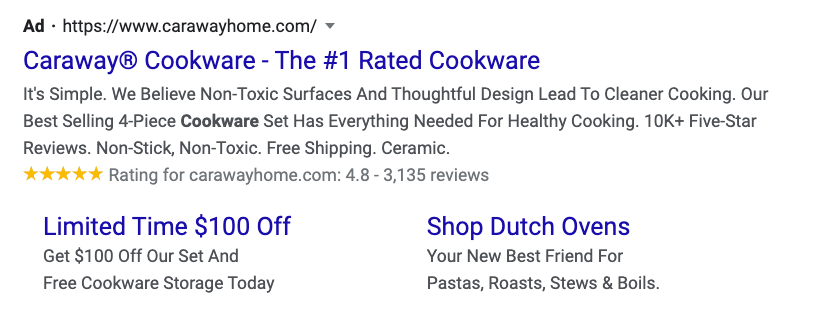

They’re staying pretty general, not going into the details about what exact pots and pans they are selling.
Other ad variations are pretty similar. Here are some headlines/descriptions they use:
- Cookware Without Chemicals
- The #1 Rated Cookware
- Cookware Set
- Designed for Any Type Of Home
- 10k+ Five-Star Reviews
These mainly try to sell people on the core USP of Caraway: non-toxic products.
Design isn’t mentioned at all in these ads. So since multiple brands are pursuing these “non-toxic products”, Caraway might not have the advantage in the search campaigns.
Ad extensions
Caraway is making good use of ad extensions, although there is one ad extension that I didn’t see: structured snippets.
So it could be that Caraway didn’t set it up, or maybe Google isn’t showing them.
Sitelinks
One of its main sitelinks is that “Limited Time $100 Off”:
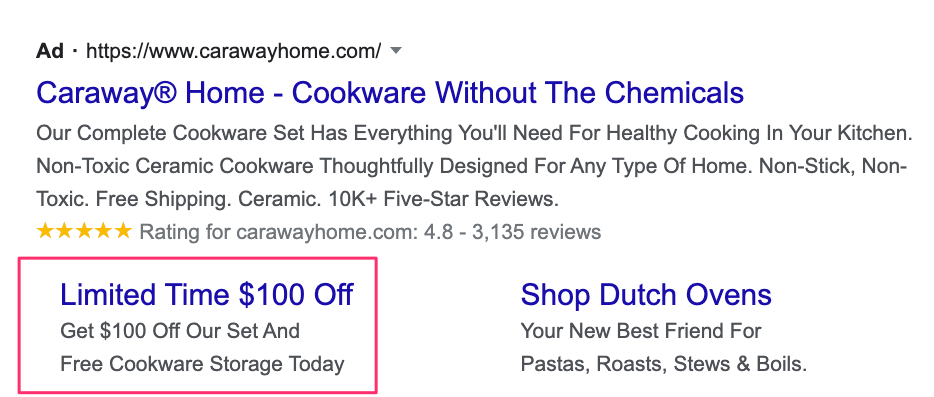

This $100 Off is not a discount. It’s simply the price of their bundle: 4 pots and pans. But I can imagine the copy on this sitelink does a lot better compared to “Caraway Cookware Set”.
Price extensions
In the price extensions, Caraway is again pushing its Cookware set.
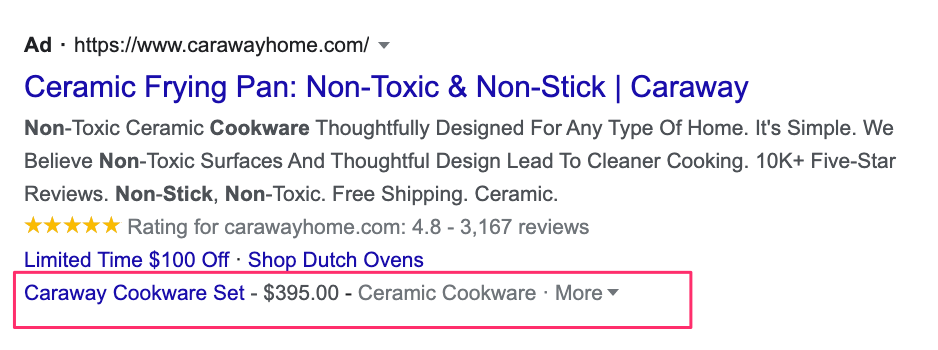

Seller ratings
Caraway is rightfully proud of its many reviews. So they’re using seller ratings.
Image extensions
Image extensions are a fairly new extension type. It’s still in beta for most advertisers. But I have to say that those ads look pretty good.
They also allow Caraway to show off their product design in its search ads.


On some mobile ads, some extensions even have a price added to them. I’m not 100% sure where this price is pulled from though.
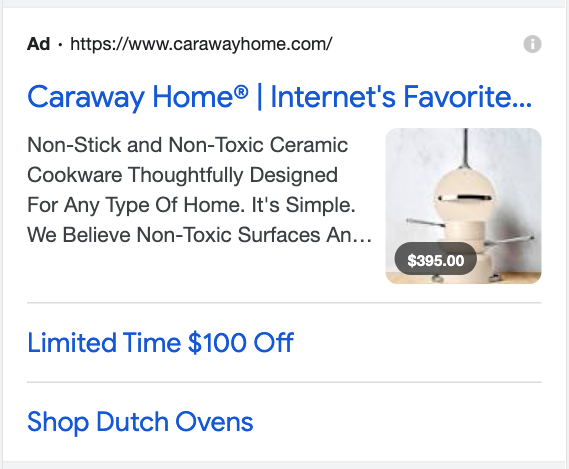

Bidding on Competitor Brand names: Caraway vs Pattern Brands Lawsuit
While researching Caraway, I stumbled onto a lawsuit that Caraway filed against Pattern Brands, a holding company that owns Equal Parts, which is a competitor to Caraway.
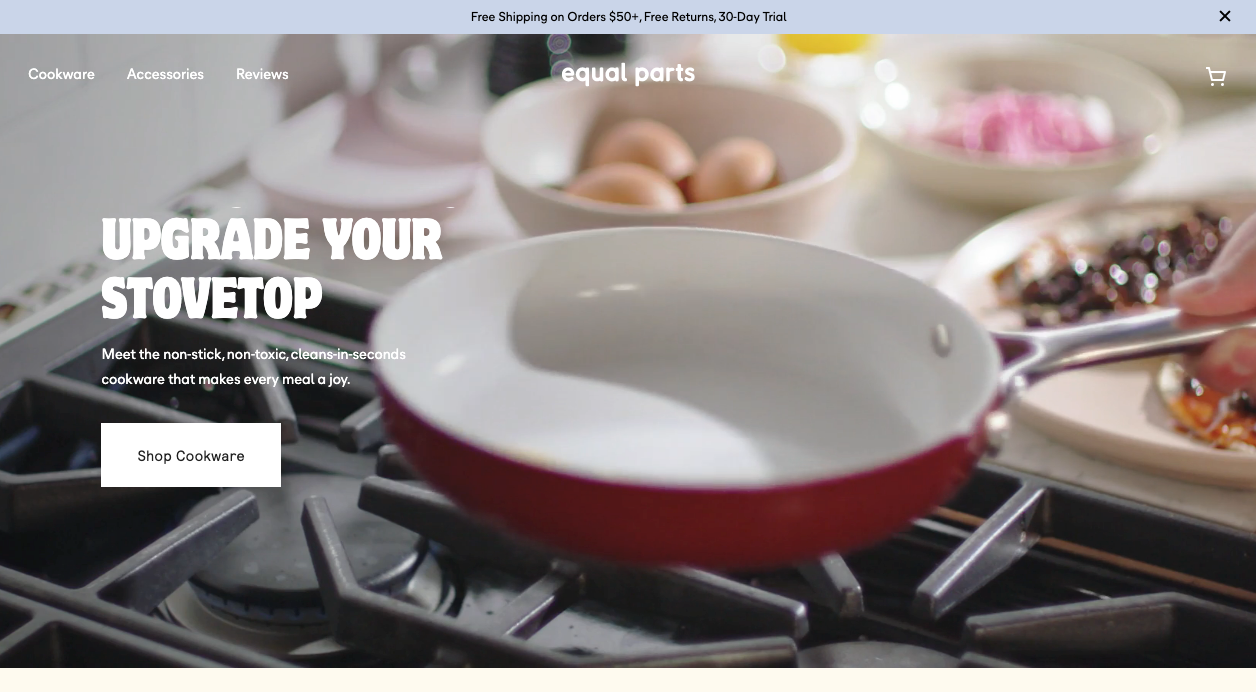

The main reason for the lawsuit was copyright infringement. This in terms of design, color, and advertising on the caraway keyword.
I don’t care much for the first two complaints, but that last one is very interesting.
In essence, Equal Parts were using the caraway keyword in their search campaigns.
As part of the lawsuit, Caraway claimed that because the other party’s products were so similar, also advertising on their branded keywords would lead to more confusion with customers.
There hasn’t been a conclusion to this lawsuit, although the judge did order “an evidentiary review of “the offending ads in context.”
So we’ll have to see how this plays out as it might impact how most advertisers bid on competitor keywords!
Non-branded paid search
The non-branded paid search campaign takes the largest part of search spending.
g-us-search-non-brand-general
- Clicks: 15,337
- Cost: $17,880
- CPC: $1.16
Top 10 non-branded keywords
- Saucepan
- dutch oven recipes
- pots and pans
- Cookware
- ceramic cookware
- saute pan
- best frying pan
- best dutch oven
- non-stick frying pan
- dutch oven pot
Most of these keywords are pretty straightforward. They either target the cookware set that Caraway sells or one of the specific pots or pans.
I would say that they are pretty broad though. Caraway is trying to target the ceramic/non-toxic part of the market. But they are advertising heavily on category terms like “cookware”.
In case the campaign isn’t producing the desired results, I would focus on the keywords where they can really make a difference: non-stick, ceramic, non-toxic cookware, etc.
Then over time, as the business grows, the campaigns can grow beyond that.
“dutch oven recipes” is the only query in that list that stands out as being a “poor match”. Recipe-related searches have a very high volume but do not convert. These clicks are also being sent to the product page. So I would say this is a good candidate for the negative keyword lists.
If Caraway was trying to build brand awareness via search, it could try advertising on these recipe keywords.
But they would need to provide a good experience to these visitors. That means having a library of recipes and featuring their products in that content. Which can be very effective, but goes far beyond running a good Search campaign!
Advertisements
With the branded search, you could see that Caraway mainly focused on its brand name and brand promise.
The non-branded ads are very similar, but it’s mainly in the headlines that they try to match the intent of the searcher.


Here are some of the headlines they use:
- 2021’s Best Sauce Pan
- 2021’s Best Dutch Oven
- Non-toxic Pots and Pans
- Over 10,000 5-Star Reviews
- The Best Fry Pan
- Caraway Home®
A couple of interesting points:
- Focus on their 10,000 great reviews (both in the headlines and ads)
- Headline formula: YEAR best PRODUCT
- Use trademark symbol ® after brand Caraway Home
Landing pages
For the most part, Caraway is sending people to the collection pages or product details pages.
These are content-rich pages that explain every part of the product.
What’s included:
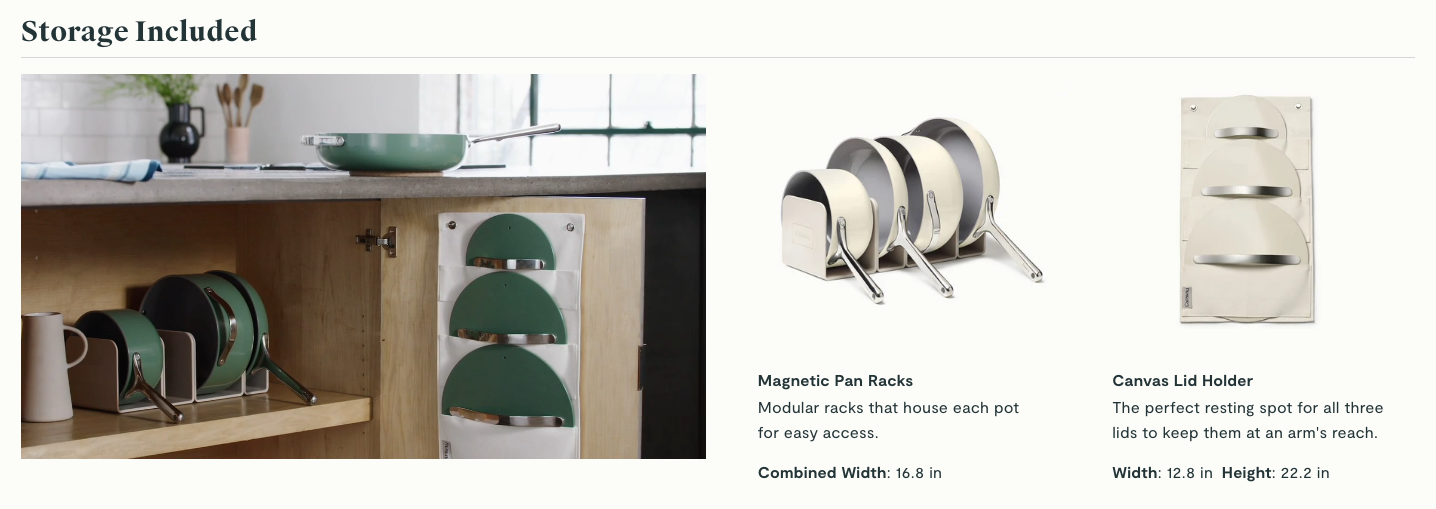

Why it’s different:
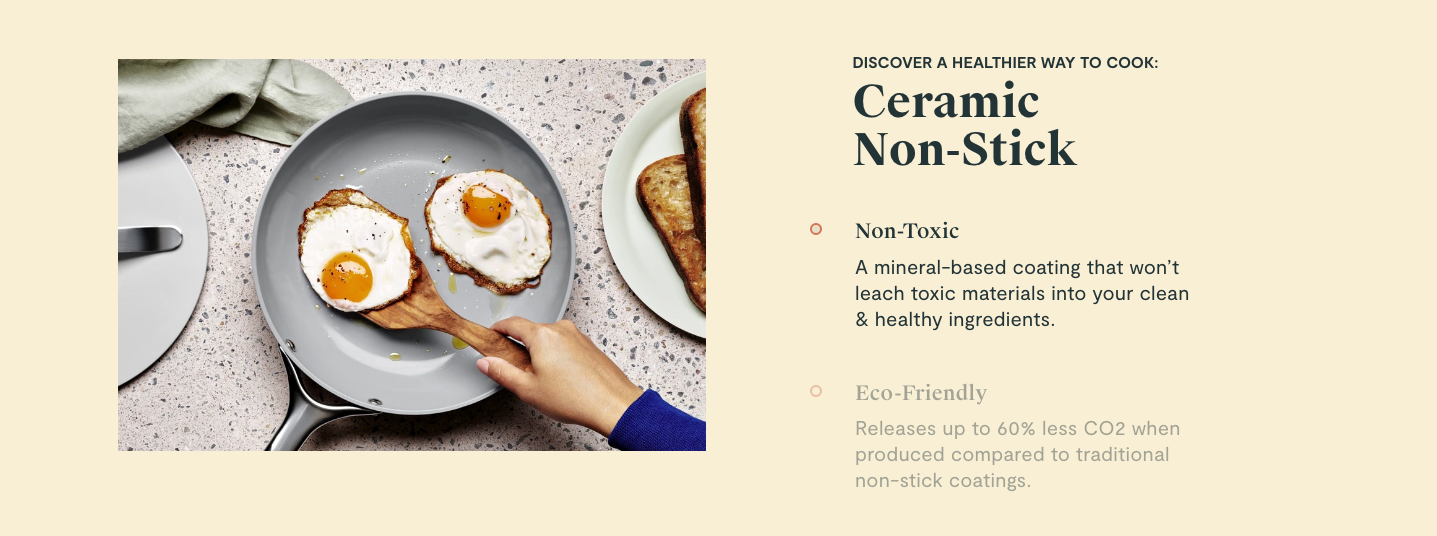

By default, Shopify doesn’t allow a lot of customisation to the product detail pages. So Caraway is using a tool called Shogun to build these pages, a landing page builder that integrates super well with Shopify. That way the experience going from page to page is very consistent.
For some keywords, they are also testing out some alternative landing pages.
Searchers for “non-stick pans toxic” are sent to a blog article talking more in-depth about why the cookware material is so important:
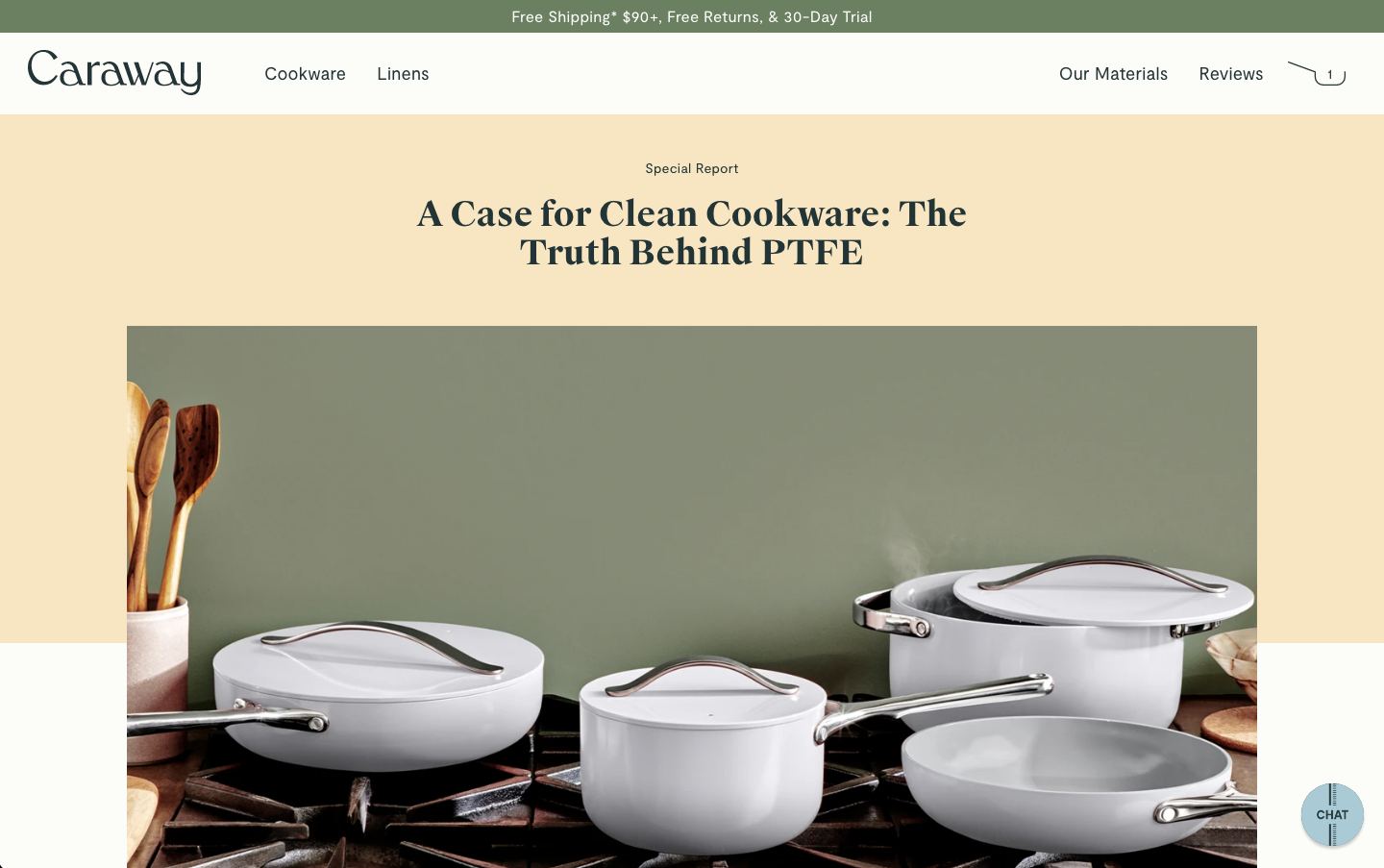

Another example is a search for “ceramic cookware”. This doesn’t point to their product detail page, but a brand intro page:
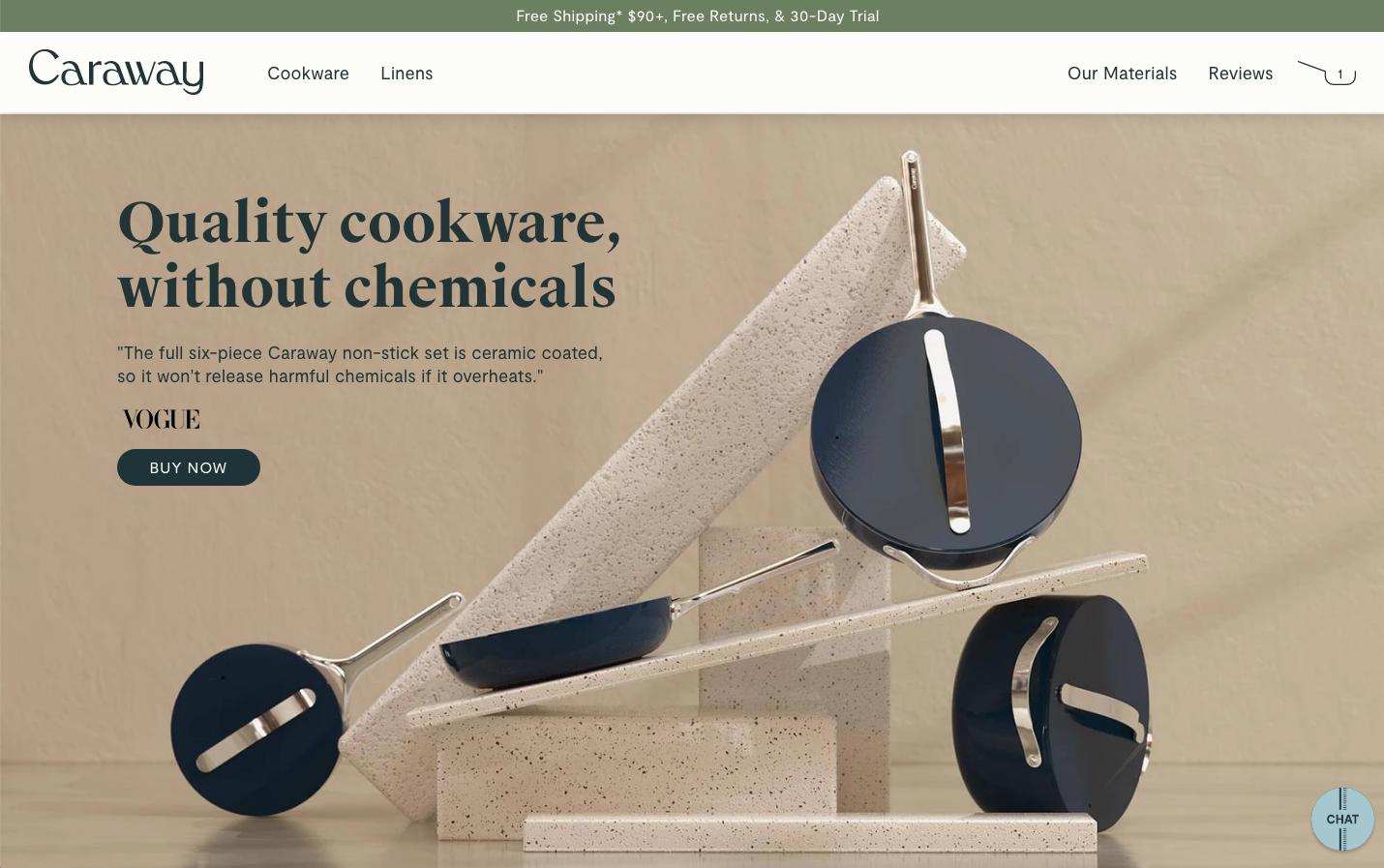

This really takes a landing page approach and allows them to leverage the social proof that the Vogue review gives them.
We’ve seen this approach before with survival brand Judy. Nik Sharma is also heavily involved with this business.
He’s a big believer in dedicated landing pages, claiming that they can reduce CPAs between 30-40%!
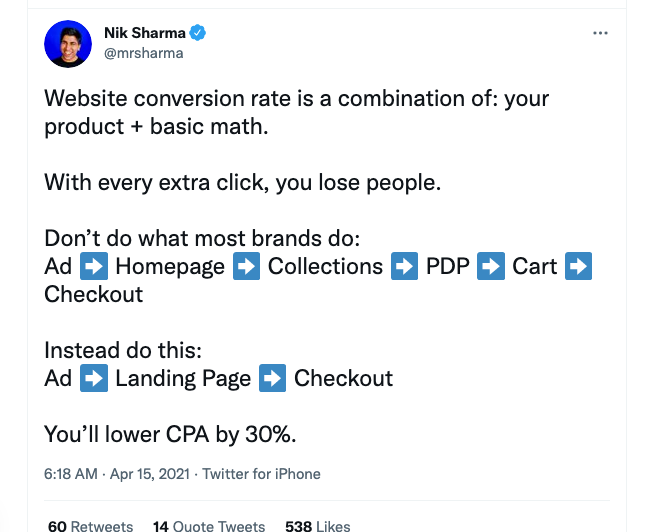

Google Shopping Ads
Caraway spends $32,250 /mo on Google Shopping Ads.
Besides its own website, Caraway also sells its products through other vendors.
So when it comes to Google Shopping, vendors like Target and Crate and Barrel are also advertising.
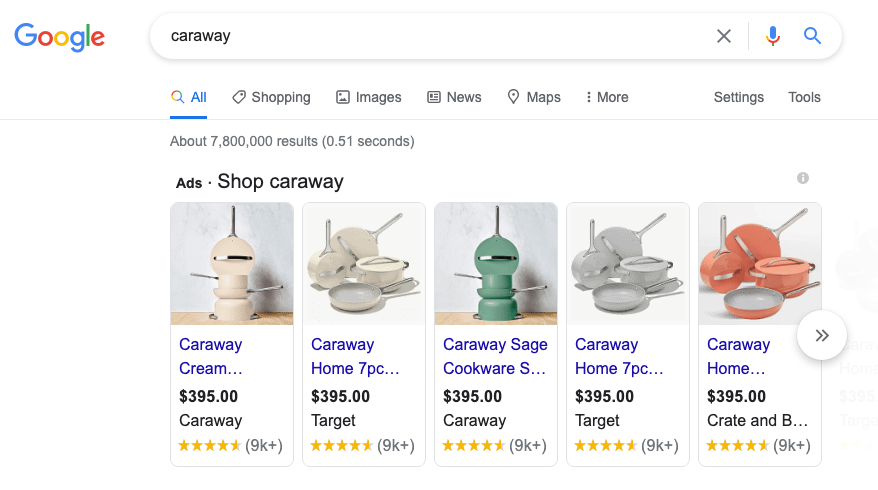

The three companies listed here all sell at the same prices, with the same # of reviews.
These are the easiest, most profitable sales for Caraway.
While it makes sense to sell through Target and Crate and Barrel (probably in-store and online), in this particular case, any sale done through their site will earn them more profit AND allows them to get their customer’s information.
So to maximize the number of sales, they need to make sure that they can dominate the search results for their brand.
To do that, they’re using a tiered Shopping structure:
- g-us-shopping-standard-brand
- g-us-shopping-standard-non-brand
This allows them to be very aggressive on their own brand, while maybe aiming for a higher ROAS on the non brand campaign.
Product ratings
As I mentioned before, Caraway has a ton of good reviews. So when it comes to the seller and product ratings, they can leverage it.
Take a look at these ads after searching for “non-stick skillet”:
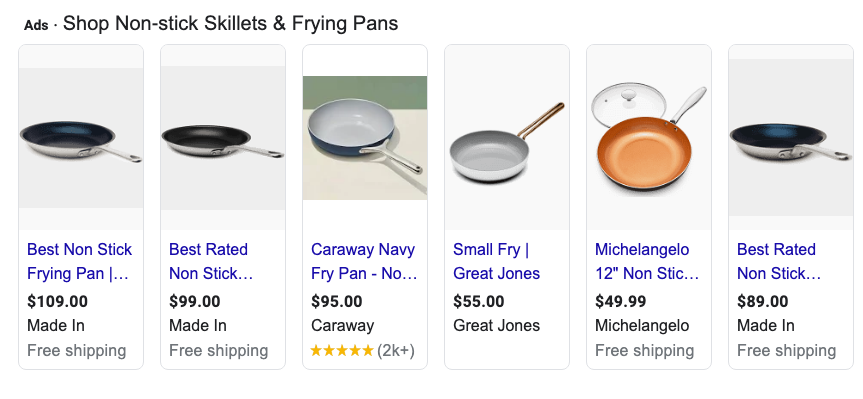

Caraway’s Shopping Ad is standing out with a 5-star rating on 2k+ reviews!
Product title optimization
Caraway uses different product titles on its website and in its feed:
- Site title: Frypan
- SEO title: Ceramic Frying Pan (10.5”): Non-Toxic & Non-Stick | Caraway
- Product feed title: Caraway Navy Fry Pan – Non-Toxic, Non-Stick, Ceramic Cookware
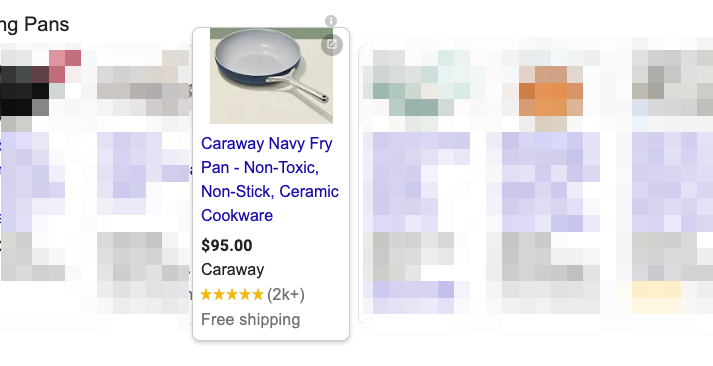

This is a pretty good product title:
- Includes brand name
- Uses the most important keywords: non-toxic, non-stick, ceramic cookware.
Two improvements:
- Include frying pan synonym: skillet
- Include the pan size, 10.5”
- More info on the material: pan is ceramic but the handle is aluminium?
Product description
If we compare the product description in the feed vs what’s on the site, we can see that the product description in the feed is a bit more optimized.
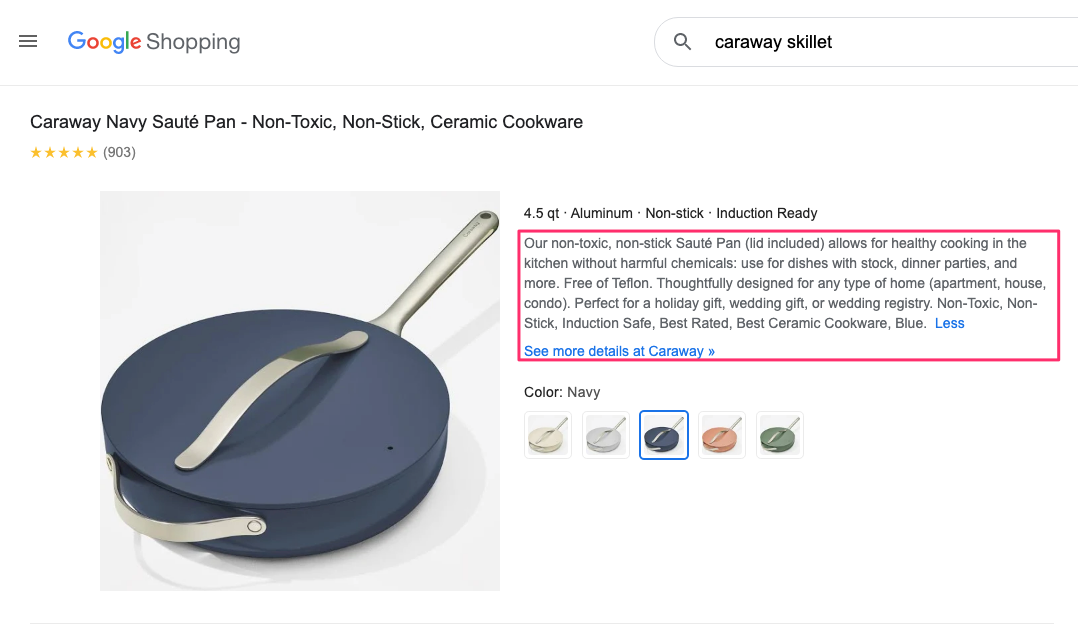

Here are some elements that have been added:
- Thoughtfully designed for any type of home (apartment, house, condo)
- Perfect for a holiday gift, wedding gift, or wedding registry.
- Best ceramic cookware
- Induction Safe
All of these phrases can help the product to show up for more relevant keywords.
Product image optimization
One of Caraway’s main distinguishing features is the colors of its pots and pans. So they try to reuse this sense for design with their product images.
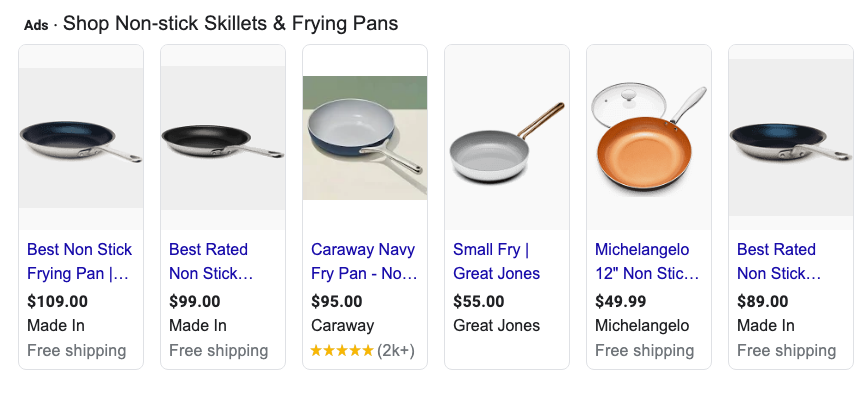

Note how all other advertisers show the product on a white background.
This helps Caraway stand out, and makes their products look a bit more premium.
Google Display Ads
Similarweb shows that 22% of traffic to carawayhome.com comes from Display ads.
But none of my usual sources show any activity.
So either Caraway is running Display ads through other ad networks, or something else is going on.
YouTube Video Ads
Caraway doesn’t seem to be doing much with YouTube Ads (yet).
Their channel only has 6 subscribers and shows a single video that was uploaded a few weeks ago.
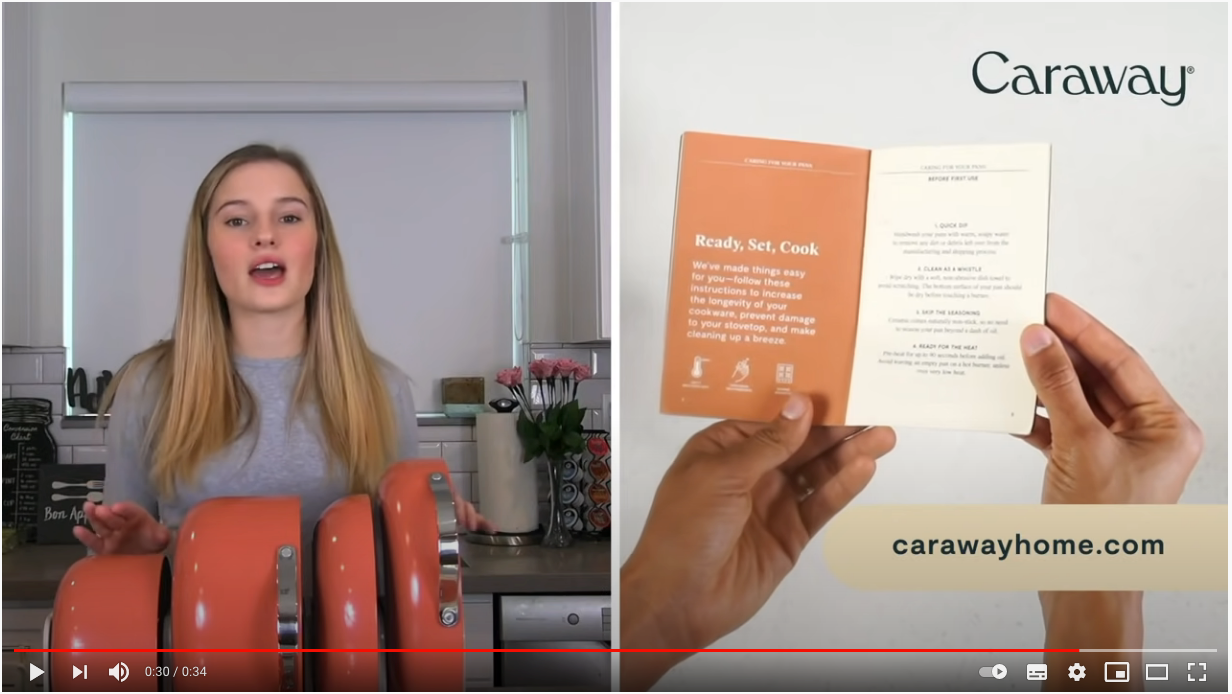

It looks like an ad:
- watermark
- Multiple UGC reviews combined
This tells me that they are in the early days of running YouTube Ads tests.
Caraway Beyond the Click
Beyond the Click is a new section in this series.
Here, we take a look at what Caraway is doing to make every click more valuable.
Onsite messaging
Caraway is using a persistent promotion bar on their site.
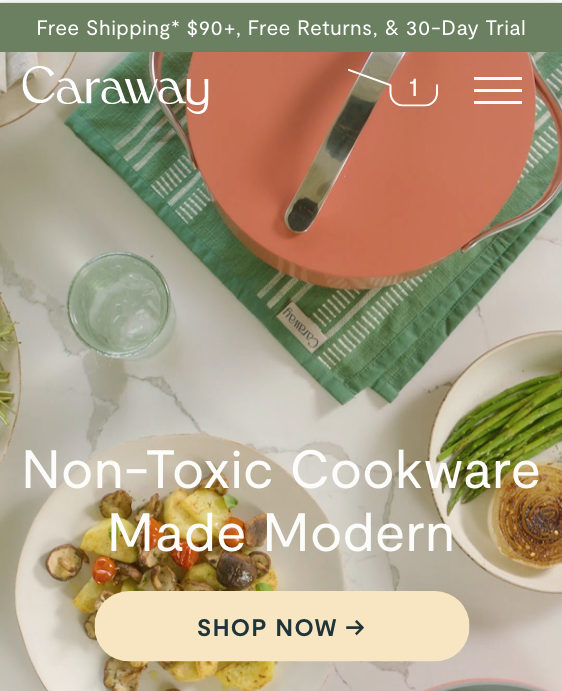

It shows:
- The free shipping threshold > $90. Since the cheapest pan is $95, they want to make sure they don’t lose money by offering free shipping on their linen products.
- Guarantee: Free returns & 30 days trial. Since a customer can return it free of charge, this might counter some objections
Email marketing
Caraway tries to capture visitor’s email addresses in a couple of different ways.
Full page pop up:
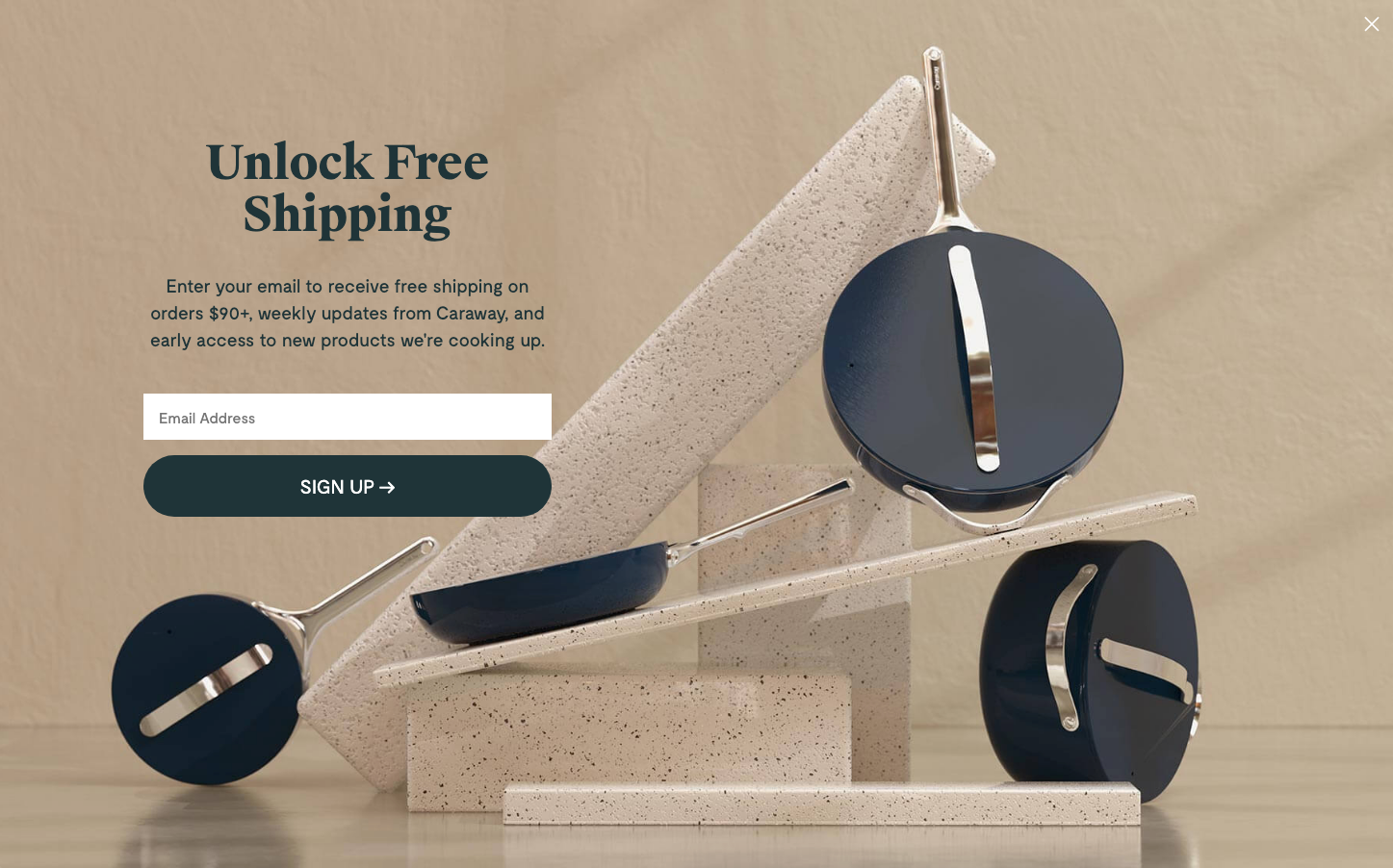

This is powered by Attentive, a mobile/SMS marketing tool.
In the website footer, there is a newsletter form:
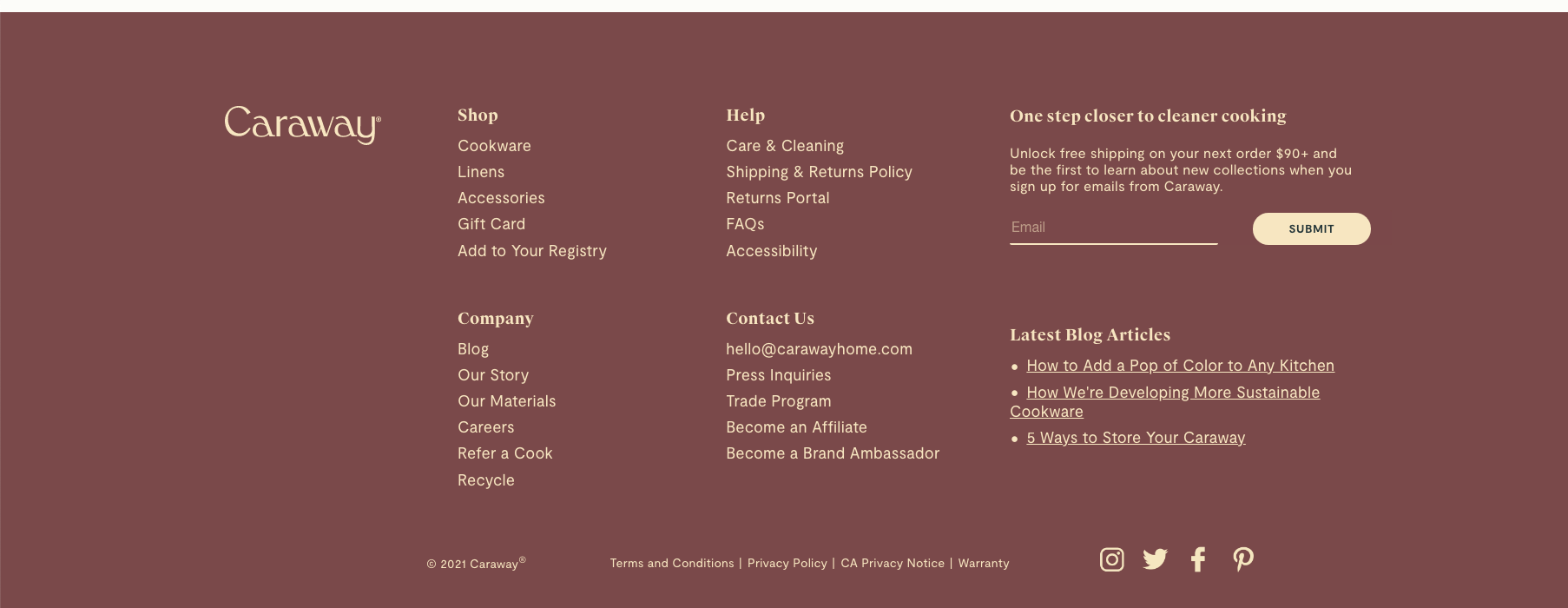

This is powered by Klaviyo, which allows them to send automated emails, including email / SMS cart abandonment flows.
One day after signing up, I got the following offer in the email:
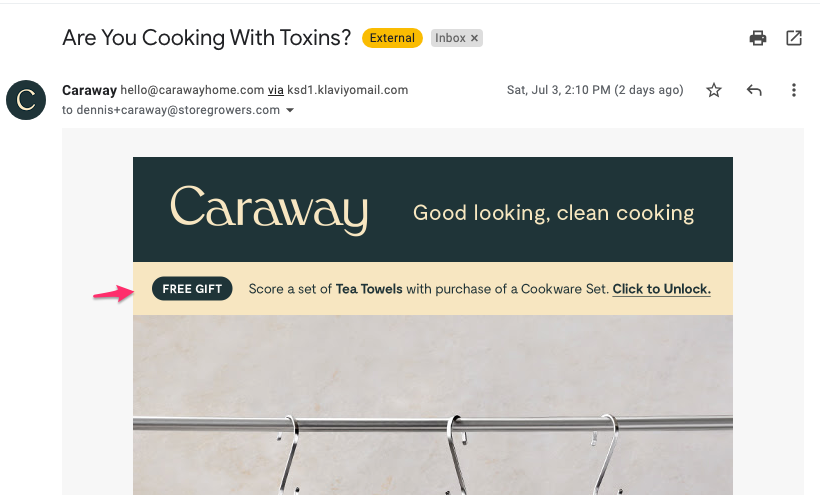

After clicking the “FREE GIFT”, I got redirected to the product detail page for the set, which didn’t include free Tea Towels, but now there was a “Start free trial” button.
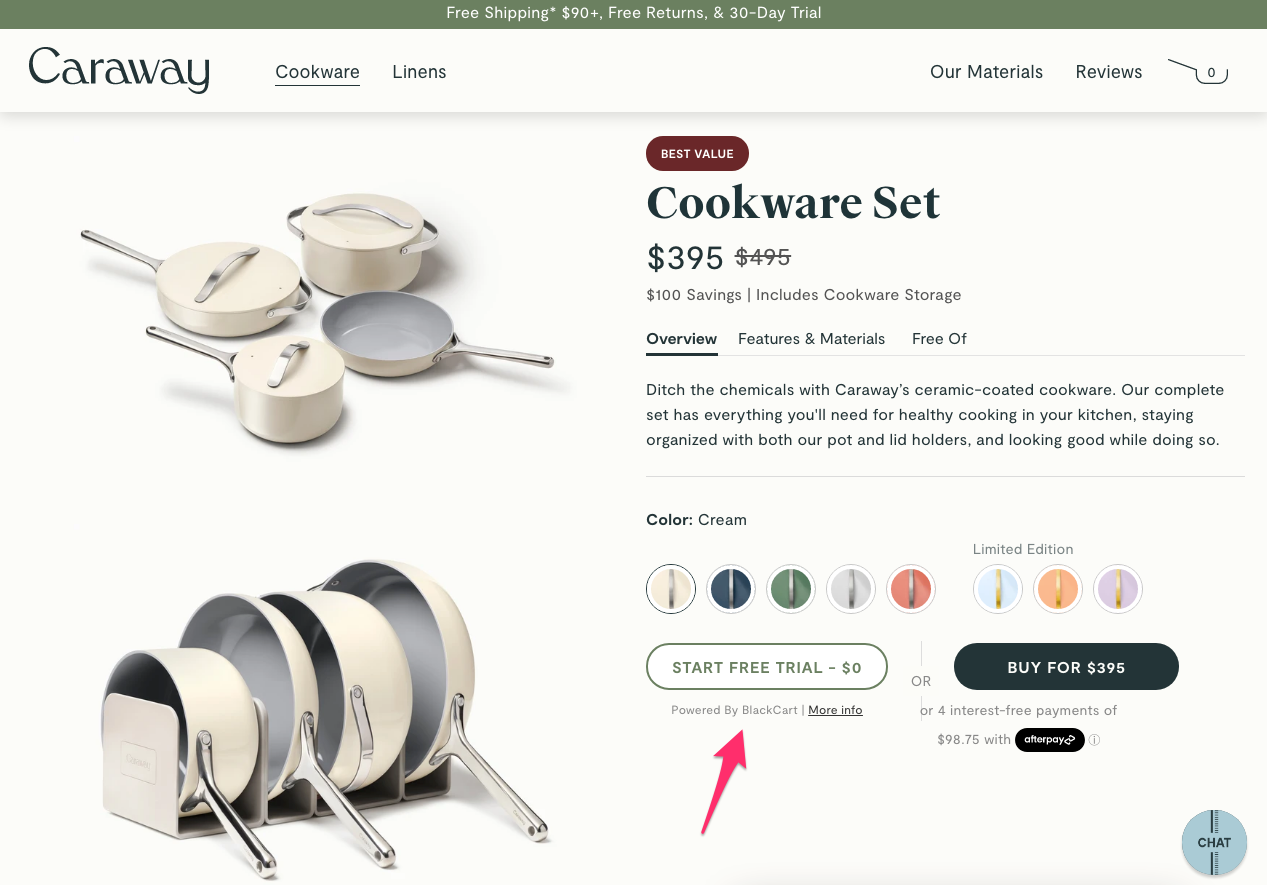

The wording is a bit strange, but this allows me to check out and effectively pay $0. Then I can test the product and pay or send back up to 7 days after delivery.
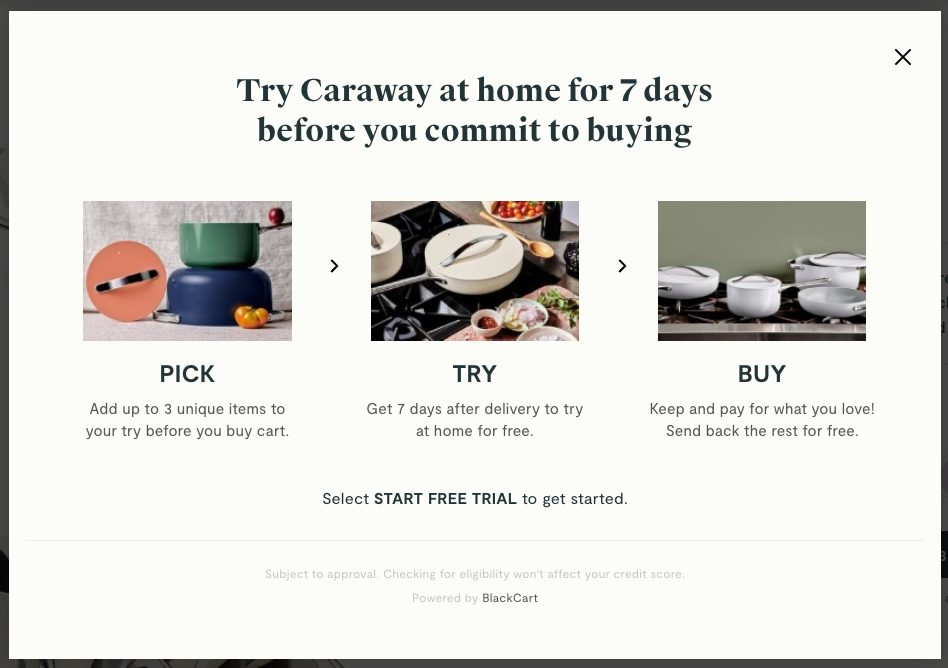

This service is powered by Blackcart. It’s a pretty interesting offer to try.
Considering the product price and seeing how popular Afterpay is (see next section), I would guess this offer converts quite well.
Afterpay
Caraway uses Afterpay to allow its customers to pay in multiple installments.
On the flyout cart, Caraway shows the details of such an installment:
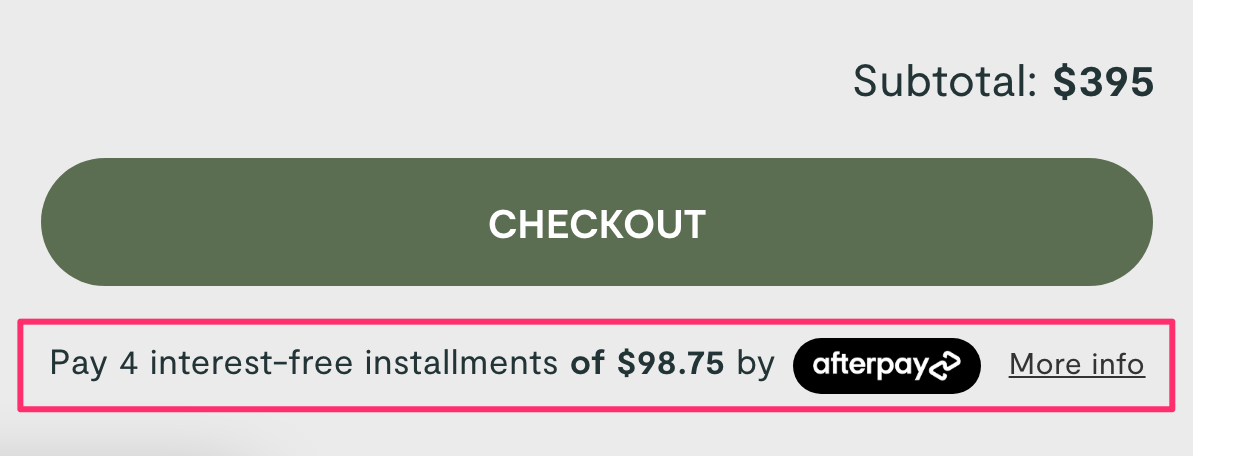

Since the products are pretty expensive, breaking that down into a few installments makes the overall cost seem lower, which helps to convert more people.
I found this interesting graph on Similarweb:
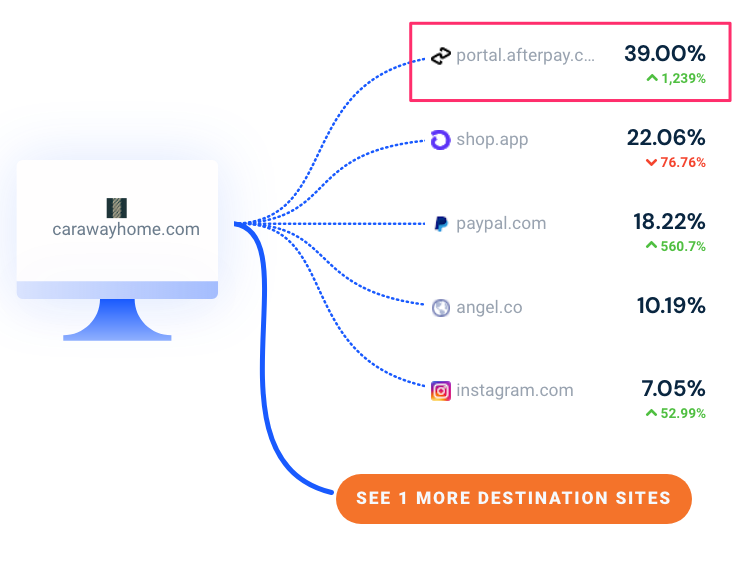

It shows the main destination of visitors once they leave the carawayhome.com domain. For eCommerce sites, you’ll often see the various payment providers listed here.
You can see Shop.app and Paypal are the most popular destinations. But more than double the amount of people check out using Afterpay. This means that customers purchasing through Afterpay make up a large part of their sales.
Upsells
At first, Caraway only sold pots and pans. Their main focus was on trying to push the cookware set vs the individual pots and pans. Which they still do heavily on site and in their ads.
But recently, they added a whole set of linens like aprons, tea towels, etc.
These are prominently displayed in your cart, making it very easy to add an extra product.
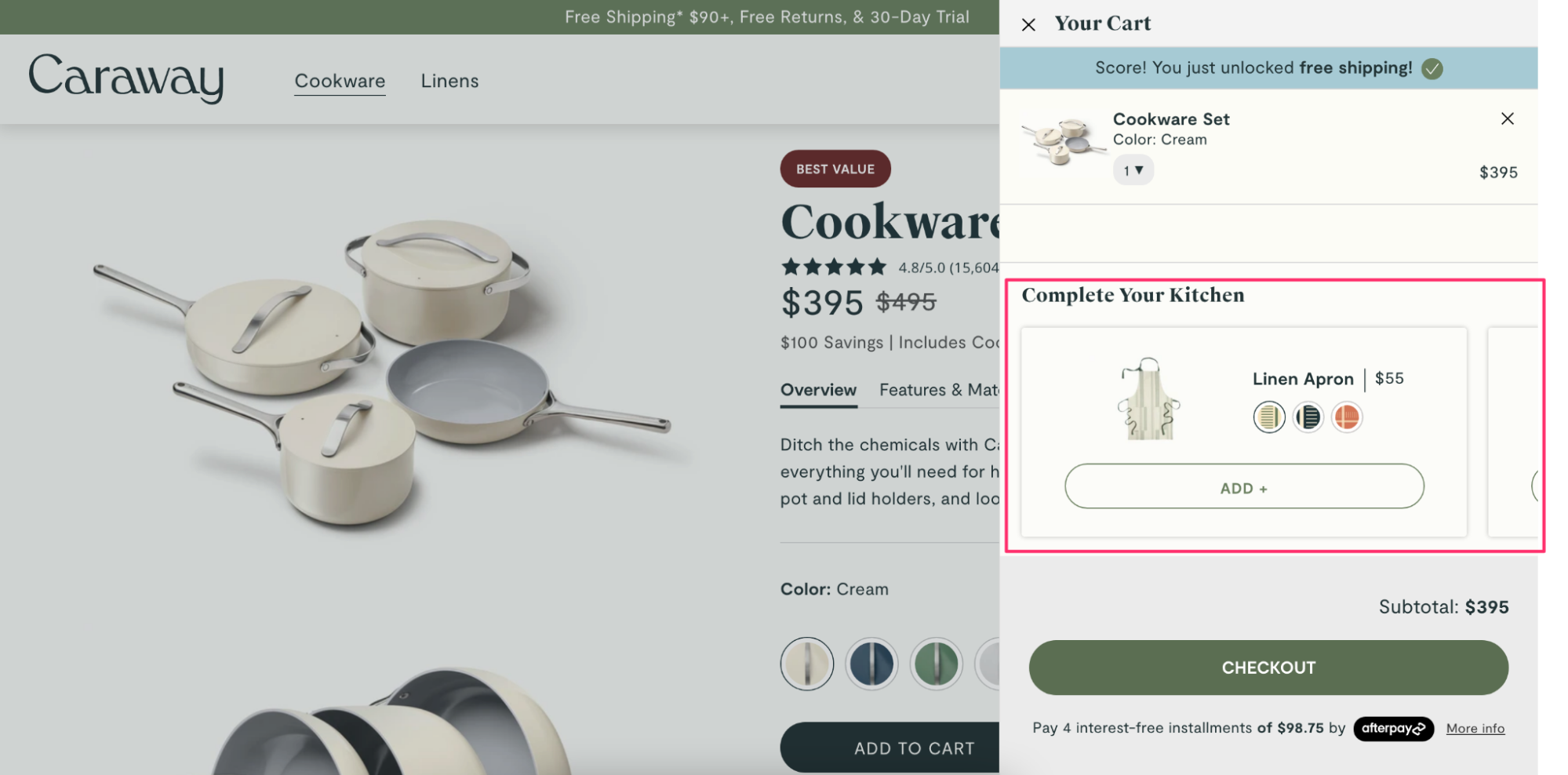

Landing pages
As I mentioned in this breakdown, Caraway uses content-rich products pages. They do this with Shogun, which is a landing page builder.
Sometimes they also build dedicated landing pages for special promotions. They do this using Unbounce, which is ideal to create stand-alone landing pages.
Live chat
Caraway uses Reamaze to run their live chat.
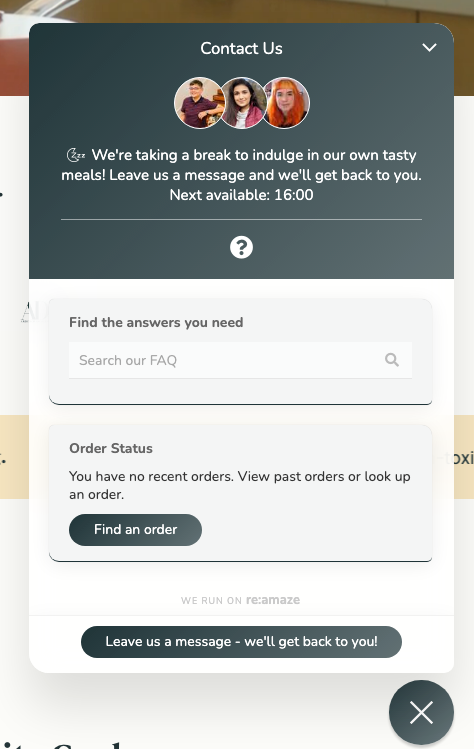

This platform also powers their customer support.
A/B testing
Caraway uses Google Optimize to run A/B tests.
On-page analysis
To understand what visitors are doing on their website, they are relying on Hotjar.
This enables them to do session recordings, heatmaps, or small surveys.
The Caraway Scoreboard
Money time
The Scoreboard is the part where we pull together all the research to look at how much money Caraway is making (or losing) with their Google Ads campaigns.
While Caraway has raised venture capital investment, they’ve only raised it a couple of years into their journey.
Here is how Caraway CEO describes their approach:
“Sustainable growth. What that means is being first-purchase profitable and leveraging our cash flow as our primary source of funding.”
Gross margin
It took quite a bit of digging to find an indicator for the gross margin of a business similar to Caraway.
I discovered another brand in the cookware market, which had a 40% gross margin.
This feels like it’s in the right ballpark.
Average order value
To come up with the average order value, we need to know the breakdown between all of the different products that Caraway sells.
If we focus on the pots and pans, I think there are two groups of customers:
- Customers that purchase the set: AOV of $395
- Customers that purchase other pots and pans: AOV $95-$125.
So let’s say that half of the people purchase the set, while the other half purchase a $95 product.
That brings the AOV to $250.
Conversion rate
Let’s put it all together.
As always, we look at the impact of different conversion rates.
In the table below all numbers remain the same, only the conversion rate increases from 0.5 – 5%:


When the average order value is high, it often means that the conversion rate is lower.
Guesstimating, Caraway’s conversion rate probably is in the 1 – 1.5% range.
Customer acquisition cost
In an interview, Caraway’s CEO mentioned that the company is first-purchase profitable.
So let’s take a look at what their customer acquisition cost should be to achieve this:
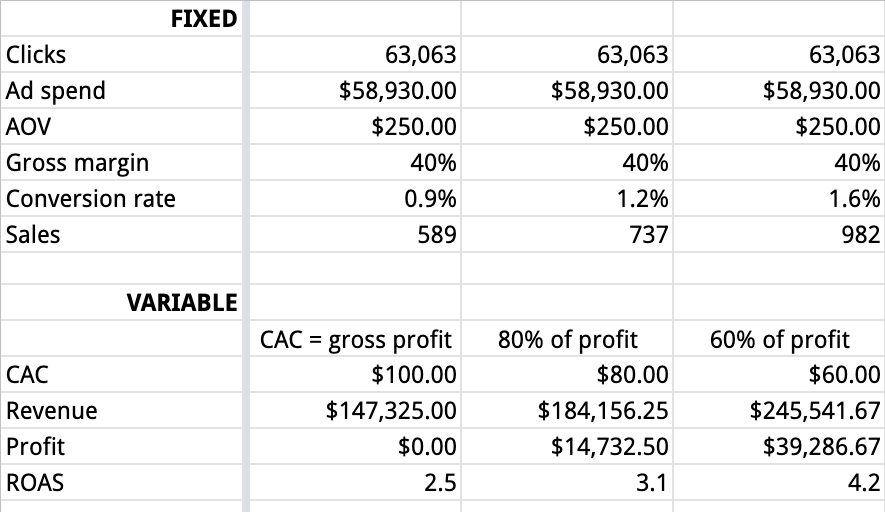

In the table above, all numbers are the same except for the CAC. That ranges from 100% (all gross profit is spent to acquire a customer) to 60% (= 40% of gross profit per customer).
That range of $60-80 is probably the most likely, it’s also in line with the conversion rate we looked at before.
So let’s be conservative and assume a CAC of $80 and a conversion rate of 1.2%.
For their Google Ads campaigns, that works out to a 3.1 ROAS.
Repeat purchase rate
The repeat purchase rate is highly dependent on the types of products a business sells.
For a supplement brand (like Ritual), returning customers are the lifeblood of the business.
Less so for Caraway. Once you buy a set of pots and pans, it’s going to be a while before you buy any new ones. (We can see the same dynamic in the luggage industry).
But growing revenue from existing customers is a key tactic to achieving higher profits.
So Caraway has been working hard to release limited editions (special colors) of their products. And they also added a lot of accessories like tea towels or aprons.
Those might help to get a few additional sales. But with the current assortment, the repurchase rate is going to be very limited.
Here is an overview with repurchase rates ranging from 5% (if you get 100 new customers, 5 will make another purchase) to 100% (= every customer buys twice)
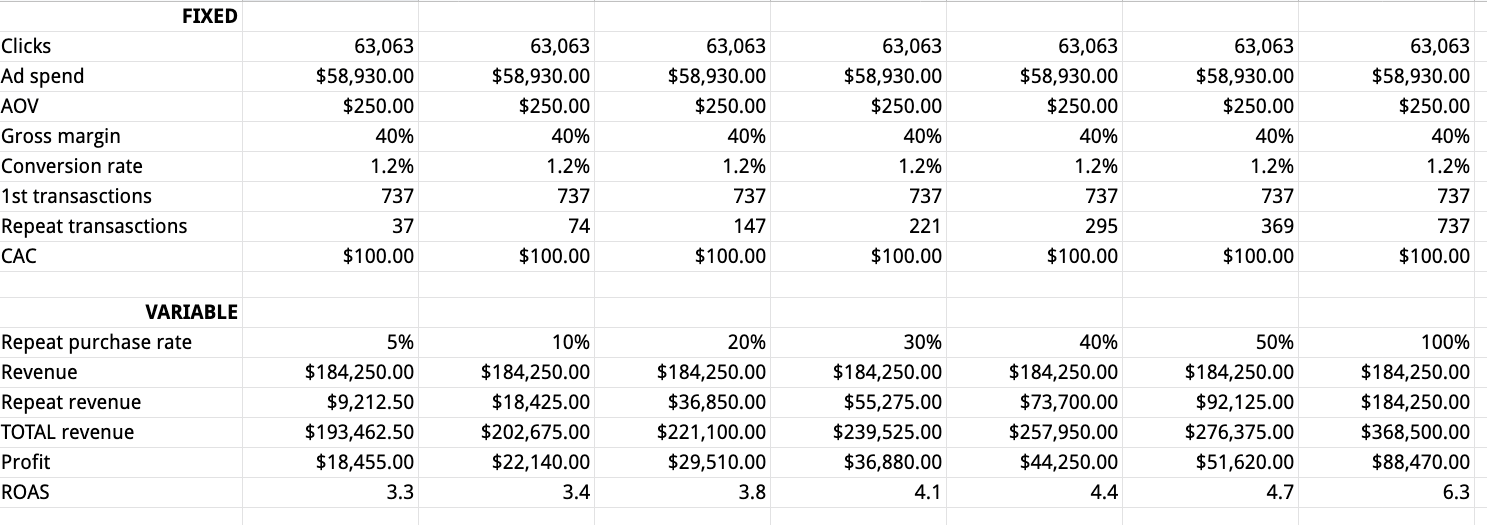

I’d guess that the repurchase rate currently is somewhere around 5% right now.
I’m pretty confident that they are hard at work to branch out and add other products into their lineup.
Summary
So, let’s put everything together!
Caraway (May 21) currently spends about $60,000/mo on Google Ads and generates $193,462 in revenue, a return on ad spend (ROAS) of 3.3.
That means they net $18,455/mo in profit from Google Ads.
They’re still getting started, and they can probably spend a lot more than they are currently doing.
That might be because they’re still taking things slowly, or because returns aren’t yet where they want them to be.
But I can see both Search and Shopping growing significantly. And once they figure out a good strategy, they can also leverage YouTube Ads.
I hope this gave you a good view into how a kitchenware brand like Caraway runs its Google Ads campaigns.
Read our other breakdowns in this series: Away – Purple – MVMT – Judy – Allbirds – Glossier – Ritual





![[Forrester Report] How Brand Manufacturers Can Manage Messy Online Marketplaces](https://thegateway.net.au/wp-content/uploads/2021/10/forrester-report-how-brand-manufacturers-can-manage-messy-online-marketplaces.jpg)